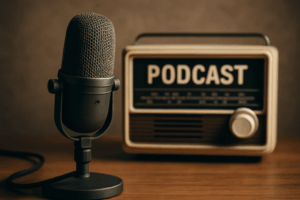Not every communications revolution begins with headlines. Some start with a quiet voice in someone’s earbuds—and change everything. Podcasts and public relations are now more connected than ever, as audio storytelling becomes a powerful tool for shaping public perception and building trust.
Podcasts have emerged as one of the most powerful yet overlooked tools in public relations. Unlike traditional media or social platforms that prioritize speed and visibility, podcasts build influence gradually. One listener at a time. One conversation at a time.
It’s not about going viral. It’s about staying relevant.
The Rise of the Unseen Medium
Bradley Davis, co-founder and CEO of Podchaser, saw the shift coming. In 2016, he launched what has become the IMDB of podcasting, recognizing early on that audio content needed a centralized, searchable database. Today, more than 70% of Americans over the age of 12 have listened to a podcast. Globally, there are more than 5 million podcast feeds.
And yet, many PR strategies still fail to account for them. Why? In part, it’s because podcasts are difficult to track. They’re long-form, unscripted, and data-light. But that’s also what makes them uniquely powerful.
More Than Metrics: The Power of Vibe
Brands like Amazon and Starbucks already understand this. They’re analyzing podcast transcripts, studying sentiment, and using that data to guide both paid and earned media. But beyond the numbers, podcasts offer something far more valuable: authenticity.
Unlike a tweet or a news segment, a 40-minute conversation reveals more than facts. It reveals tone, perspective, vulnerability—what some now call the “vibe.” It’s not about delivering three key messages. It’s about showing up with consistency and honesty.
Podcast listeners tend to be engaged, thoughtful, and influential. They aren’t just consuming content passively. They’re integrating it into how they think, lead, and make decisions.
Trust Is the New Headline
So what does this mean for public relations professionals?
It means podcast guest pitching is often more effective than launching your own branded show. It means sentiment and nuance matter more than impressions. And it means trust—not attention—is the new gold standard for media success.
Podcasts allow spokespeople to drop the mask, ditch the script, and connect. They provide space for complex stories and human moments. And in a media landscape driven by authenticity, that’s exactly what audiences crave.
Attention is still important. But in today’s world, it’s fleeting. Trust, once earned, endures.
While the world watches the headlines, podcasts are shaping public opinion behind the scenes—one voice, one story, one listener at a time. And for the professionals guiding brand narratives, it’s time to stop ignoring the quiet and start listening to what really moves people.
Because the future of PR isn’t louder.
It’s deeper.


